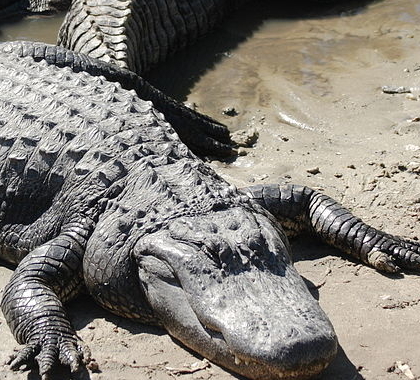The State of Louisiana and some landowners and boutique retailers are suing California to prevent a decades-old law banning the importation and sale of alligator and crocodile products in the state from going into effect.
California has had a law banning commerce in alligator and crocodile products on the books since the early 1970s, but it has repeatedly issued exceptions allowing such sales. The most recent exemption expired on December 31, 2019, and at the behest of animal rights groups, California’s legislature declined to renew it.
Ban on Hold
U.S. District Judge Kimberley J. Mueller issued a temporary restraining order on December 23, 2019 prohibiting enforcement of the law in response to a lawsuit filed by Delacroix Corp., the Louisiana Landowners Association, and the Louisiana Department of Wildlife and Fisheries (LDWF0.
California’s ban violates the Interstate Commerce Clause of the U.S. Constitution and is preempted by the federal Endangered Species Act, said Louisiana Attorney General Jeff Landry in a press release announcing the lawsuit.
Landry says Section 653(o) of the California penal code, enacted to prohibit the importation, possession with intent to sell, and sale of all alligator products in California, was enjoined in 1979 by a federal district court in California in Fouke Co. v. Brown.
“California’s law is in direct conflict with Federal Law and court precedent,” said Landry in the statement. “The court found that the alligator ban is preempted by the Endangered Species Act, and the Fouke injunction is still in force.
“Recognizing its legal defects, California repealed the alligator ban in 2006, but only through December 31, 2019,” Landry said.
California Attorney General Xavier Becerra did not contest the injunction, which is in effect until at least after an April 24 hearing.
Ending Animal Use
In 2019, when the legislature considered whether or not to renew the exemption during the 2019 legislative session, the Center for Biological Diversity, Defenders of Wildlife, People for the Ethical Treatment of Animals, and the Sierra Club persuaded it not to do so, as part of a broader California campaign against trade in animal products.
Louisiana officials, alligator hunters and farmers, and owners of California boutiques that sell alligator merchandise say the California ban is harmful to businesses and the environment.
For years, California has accounted for a large percentage of the U.S. market for alligator products, and the prospect of the ban being re-imposed is already harming the industry, the plaintiffs say.
“Product manufacturers are curtailing orders for alligator hides and hide prices are falling as a result,” the complaint stated. “By way of example, one tannery had an order for 600 alligator hides cancelled, with the cancellation directly attributable to Section 653o and based on the customer having a warehouse in California. And one of the world’s largest purchasers of alligator hides has threatened to cease purchasing those hides entirely.”
Alligators Thriving
California enacted its ban on alligator imports and sales a few years after the federal government placed the species on the endangered species list in 1967, even before the government passed the ESA in 1973 and prohibited alligator hunting.
Louisiana landowners, alligator hunters, farmers, and conservationists responded to the listing by developing a new alligator management and marketing plan that provided funding for coastal restoration and wetlands protection initiatives and actively managed alligator and American crocodile populations. Alligators now provide $80 million annually to the Louisiana economy, with more than a million wild gators and six million farmed gators harvested. Currently, the Louisiana alligator population stands at more than two million wild gators and another 900,000 on alligator farms.
Even before alligators were removed from the endangered species list in 1987, in the 1979 Fouke ruling a federal court overturned the state’s ban, saying the law was preempted by federal law and hampered recovery efforts. Instead of repealing the law, California’s legislature placed a moratorium on its enforcement, which they renewed periodically. The moratorium lapsed on December 31, 2019.
Potential Harm to Wetlands, Gators
Louisiana and its co-plaintiffs claim the ban would harm Louisiana’s economy and could imperil wetlands recovery efforts in the state and thus alligators as well.
“[L]andowners will be forced to greatly reduce or cease their erosion control efforts because they will be unable to economically sustain those efforts, resulting in irreparable harm to their property as well as harm to Louisiana’s sovereign environmental interests in wetland preservation,” the lawsuit stated.
Extensive Oversight
The production and sale of alligators and alligator products is highly regulated at the international, federal, and state levels, says Delacroix Corp. Attorney Melinda Brown.
“Alligator populations are assessed annually through aerial nest surveys, and based on those population estimates, harvest quotas are determined by region and habitat type,” said Brown. “Harvest quotas are then regulated through a mandatory permit and tagging system, and prior to shipment, each alligator hide must be inspected by a Louisiana Department of Wildlife and Fisheries agent who verifies the hide is tagged.
“Without the state shipping permit and the appropriate federal Convention for International Trade in Endangered Species (CITIES) tag, alligator hides cannot enter commerce,” Brown said. “If shipped abroad, the tags are inspected by U.S. Port Inspectors at the port of export and then by CITES officials at each port of entry in the county they are shipped to.”
Louisiana also must assure federal regulators continued use of alligator will not imperil the species, Brown says.
“Every year, Louisiana is required to analyze and certify to the U.S. Fish and Wildlife Service that its harvest and export of American alligators are not detrimental to the survival of the species and that all alligators entering trade have been legally acquired,” Brown said.
Duggan Flanakin ([email protected]) writes from Austin, Texas.




